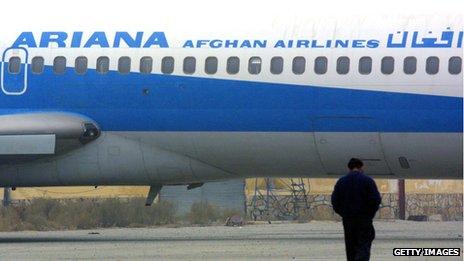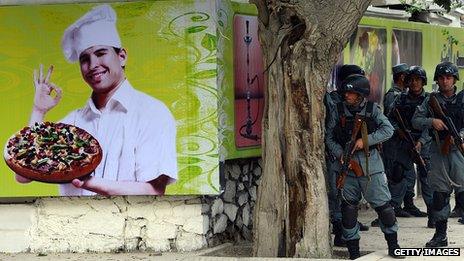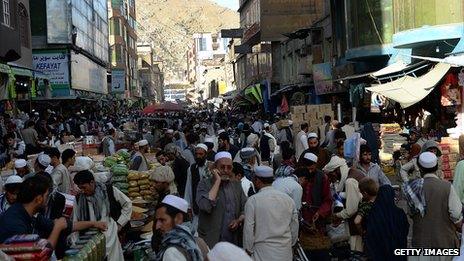Afghanistan: Towards a brighter future or a darker past?
- Published

Afghanistan's national airline suffered under the Taliban
Every time I land at Kabul airport I remember a day in December 2001.
It was a day Afghan pilots cried.
We stood on a cracked and cratered tarmac to witness the landing of the only plane from Ariana National Airlines to survive the punishing years of war.
That one battered aircraft was a poignant promise of a new beginning at the end of Taliban rule.
Land at Kabul International airport now and you are taken by how much there is of everything.
A new terminal and the bustling airport road are decked with a dizzying array of billboards promoting private airlines, mobile phone companies, TV channels. Every time I come back to Kabul, there's another flashy slogan evoking another glorious dream.
This time, "Honeymoon Package in Dubai" caught my eye, along with the old favourite "Home of the Brave".
Political transition
But this is a country where new and old still fight for space, in every part of life.
Next to images of smartly dressed Afghans smiling into cell phones, there are still the hoardings for slain warlords including the fabled commander Ahmad Shah Massoud, and former President Burhanuddin Rabbani.
For all its glittering wedding halls and stylish cafes, Kabul is still a city at war. More and more streets are lined with concrete walls, coils of razor wire, armed guards at locked gates.

Afghan security forces still face insurgent attacks on Kabul's streets
I find myself getting lost on avenues that are now unrecognizable, clogged with traffic, closed by new barriers.
It's in this city that a decisive political transition is now gathering pace, where new and old are also coming together, and could collide.
In recent weeks a succession of turbaned warlords and finely suited technocrats filed into the election commission to register their nominations for president. They all made an entrance, for a gaggle of tv cameras, with two chosen vice presidents, and an entourage of aides and hangers-on in tow.
This chequered canvas is a snapshot of post Taliban Afghanistan, 13 years on.
Behind the walls, in humble homes and monstrous mini-palaces, the 5 April election is now the talk of the town. The official campaign period hasn't yet begun, but politicking is underway in earnest.
No one expects all 26 teams to last the race. Some won't muster the 100,000 signatures from 20 provinces needed to run.
Healthy debate
Wannabe presidents with no prospect of winning will be encouraged to drop out, with a promise of a prestigious post or perks. Some sign up for that very reason.
Some believe the vote will be delayed by security fears, or snowbound roads.
Others maintain there won't be an election at all.
"Chaos will be created," said one informed political observer at a dinner at the home of an Afghan friend. "A national emergency will be declared and President Karzai will remain in power."
"Absolutely not," insists another analyst. "President Karzai is fully invested in a smooth transition."

Afghans will choose a new president at an election in April 2014
And then there's speculation over who is the president's man. Is it his former Foreign Minister Zalmai Rassoul, or powerful commander Abdul Rasul Sayaf? And what about the president's own brother Qayum?
If debate is any measure of a healthy political culture, Afghanistan gets high marks.
With voting cards for sale in markets and back streets, and an electoral machine run by Karzai loyalists, there's already anxiety over whether, in the end, the vote will be seen as legitimate, accepted by winners and losers alike.
"Will there be a shoot-out in the city?" an expatriate new to Kabul nervously asked an Afghan friend. "Of course not," she said. "They now own too many glass buildings here."
The question of whether this election will move Afghanistan towards a brighter future, or pull it back to a darker past, is the biggest question of all.